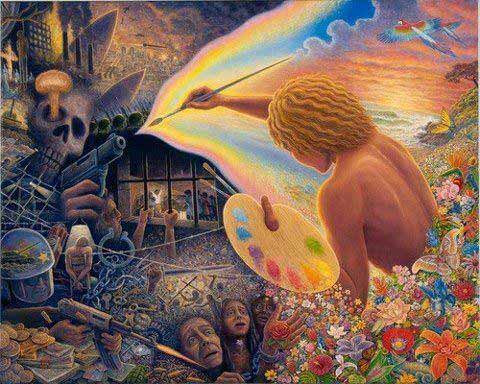[vc_row][vc_column width=”1/1″][vc_column_text]
Questioner: What do you mean by transformation?
Jiddu Krishnamurti : Obviously, there must be a radical revolution. The world crisis demands it. Our lives demand it. Our everyday incidents, pursuits, anxieties, demand it. Our problems demand it. There must be a fundamental, radical revolution because everything about us has collapsed. Though seemingly there is order, in fact there is slow decay, destruction – the wave of destruction is constantly overtaking the wave of life.
 So there must be a revolution – but not a revolution based on an idea. Such a revolution is merely the continuation of the idea, not a radical transformation. And a revolution based on an idea brings bloodshed, disruption, chaos. Out of chaos you cannot create order; you cannot deliberately bring about chaos and hope to create order out of that chaos. You are not the God-chosen who are to create order out of confusion.
So there must be a revolution – but not a revolution based on an idea. Such a revolution is merely the continuation of the idea, not a radical transformation. And a revolution based on an idea brings bloodshed, disruption, chaos. Out of chaos you cannot create order; you cannot deliberately bring about chaos and hope to create order out of that chaos. You are not the God-chosen who are to create order out of confusion.
That is such a false way of thinking on the part of those people who wish to create more and more confusion in order to bring about order. Because the moment they have power, they assume they know all the ways of producing order. But seeing the whole of this catastrophe – the constant repetition of wars, the ceaseless conflict between classes, between peoples, the awful economic and social inequality, the inequality of capacity and gifts, the gulf between those who are extraordinarily happy, unruffled, and those who are caught in hate, conflict, and misery – seeing all this, there must be a revolution, there must be complete transformation, must there not?
Now, is this transformation, is this radical revolution an ultimate thing, or is it from moment to moment? I know we would like it to be the ultimate thing because it is so much easier to think in terms of far away. Ultimately we shall be transformed, ultimately we shall be happy, ultimately we shall find truth, but in the meantime, let us carry on. Surely, such a thing that must come from moment to moment, must be discovered anew, and surely, there can be no discovery through accumulation. How can you discover the new if you have the burden of the old? It is only with the cessation of that burden that you discover the new.
So, to discover the new, the eternal, in the present, from moment to moment, one needs an extraordinarily alert mind, a mind that is not becoming. A mind that is becoming can never know the full bliss of contentment – not the contentment of smug satisfaction, not the contentment of an achieved result, but the contentment that comes when the mind sees the truth in what is and the false in what is. The perception of that truth is from moment to moment, and that perception is delayed through verbalization of the moment.
[pull_quote_center]So, transformation is not an end result. Transformation is not a result. Result implies residue, a cause and an effect. Where there is causation, there is bound to be effect. The effect is merely the result of your desire to be transformed. When you desire to be transformed, you are still thinking in terms of becoming, and that which is becoming can never know that which is being.[/pull_quote_center]
Truth is being from moment to moment, and happiness that continues is not happiness. Happiness is that state of being which is timeless. That timeless state can come only when there is a tremendous discontent – not the discontent that has found a channel through which it escapes, but the discontent that has no outlet, that has no escape, that is no longer seeking fulfillment.

Only then, in that state of supreme discontent, can reality come into being. That reality is not to be bought, to be sold, to be repeated; it cannot be caught in books. It has to be found from moment to moment, in the smile, in the tear, under the dead leaf, in the vagrant thoughts, in the fullness of love – for love is not different from truth. Love is that state in which thought process as time has completely ceased. And where love is, there is transformation. Without love, revolution has no meaning, for then revolution is merely destruction, decay, a greater and greater, ever-mounting misery. Where there is love, there is revolution, because love is transformation from moment to moment.
[/vc_column_text][td_text_with_title custom_title=”Source”]
Jiddu Krishnamurti talk, February 20, 1949
[/td_text_with_title][/vc_column][/vc_row]

0 Comments